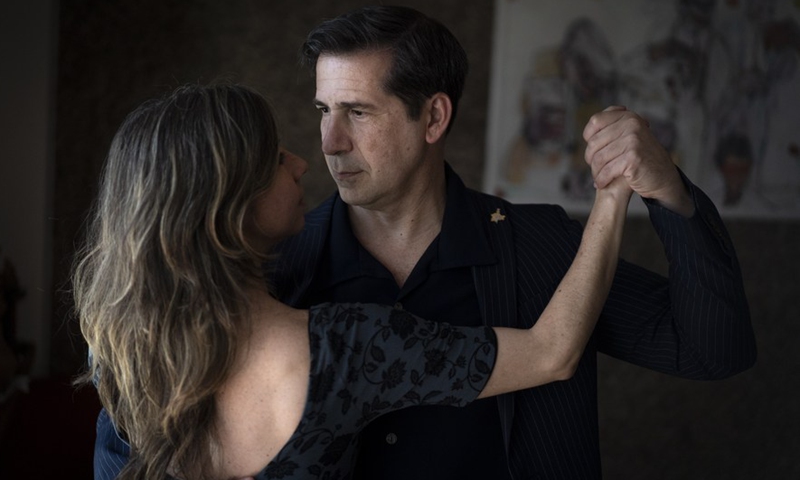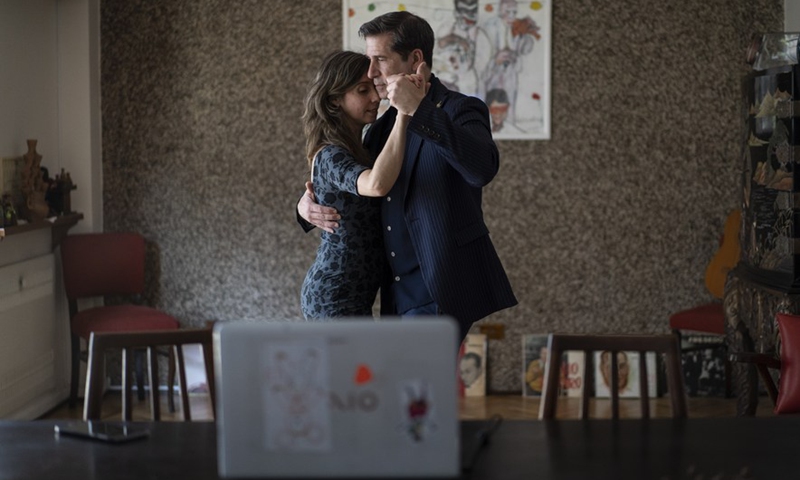Argentina holds virtual competition of traditional tango dance amid pandemic
Source: Xinhua Published: 2020/8/31 9:59:54

Juan Guerri (R) and Natalia Fossati demonstrate Tango moves during an online class at an apartment in Buenos Aires, Argentina, July 31, 2020. (Photo by Martin Zabala/Xinhua)
The Buenos Aires International Tango Festival and World Cup, an annual event that celebrates the traditional Argentine dance form and the music, is taking place online for the first time due to the COVID-19 pandemic.
The event, which began on Wednesday, offered extensive digital contents so that tango lovers can enjoy dance classes, performances, and even video clips of tango singers from around the world, and pay tributes to great tango artists.
The virtual competition was realized with means of communication people live with, said Gabriel Soria, artistic director of the event and president of the National Academy of Tango.
"For example, artists record from their homes, sometimes with a cell phone or with a more professional camera, but always respecting social distancing and quarantine rules," she added.
The opening includes a concert celebrating women in tango and a dance show starring previous champions.

Juan Guerri (R) and Natalia Fossati demonstrate Tango moves during an online class at an apartment in Buenos Aires, Argentina, July 31, 2020. (Photo by Martin Zabala/Xinhua)
This year, the world tango competition brought together more than 200 dancers from countries including Brazil, Russia, Japan, Malaysia, Norway, and of course, Argentina. Most participants are from outside the country.
"Each contestant couple sent a video that was evaluated by a jury and now those couples will be voted on by the public," said Soria.
On Sunday, when the event concludes, winners will be chosen in the Stage Tango category, a version of the dance which has been specially choreographed and staged for a performance, and in the Salon Tango category, which is a more traditional style that is danced in the milongas, or traditional dance halls, of Buenos Aires.
"August is the month of tango in Buenos Aires and the festival usually lasts 14 days, with a presence in different neighborhoods and stages, in addition to the finals of the Tango World Cup at the Luna Park stadium. This could not be done during the pandemic and the challenge was to put on a different festival," said Soria.
Soria believes that tango has shown throughout its history that it has the ability to overcome adversities and adapt, adding "it went through two world wars in the 20th century, it went through other pandemics, social and technological changes, such as radio, film, or television, and it maintains itself, generating its own culture."
"Tango needs a hug to be danced, it needs the collective 'milonga.' It needs the stage, the audience to be danced. And we do not have all of that in person today, but hopefully the possibilities that the pandemic has taken from us can be recovered in the healthiest way and through taking care of ourselves," said Soria.
Posted in: AMERICAS